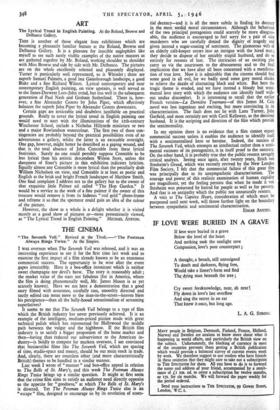THE CINEMA
" The Seventh Veil." Revived at the Tivoli.—" The Postman Always Rings Twice." At the Empire.
I WAS overseas when The Seventh Veil was released, and it was an interesting experience to see it for the first time last week and to examine the first impact of a film already known to be an enormous commercial success. The opportunity to be wise after the event gapes irresistibly. Here is a box-office intoxicant which is neither sweet champagne nor devil's brew. The story is reasonably adult ; the market value of the stars not fabulous (for in America, where the film is doing phenomenally well, Mr. James Mason is as yet scarcely known). Have we not here a demonstration that a good story filmed with assurance, carefully cast, smoothly directed and tautly edited can mean more to the man-in-the-street—heaven bless his percipience—than all the bally-hooed sensationalism of screaming superlatives?
It seems to me that The Seventh Veil belongs to a type of film which the British industry has never previously achieved. It is an example of the intelligent, medium-priced picture made with great technical polish which has represented for Hollywood the middle path between the vulgar and the highbrow. If the British film industry is to satisfy a bigger proportion of the home market and then—having thus reduced our subservience to the American in- dustry—is boldly to compete for markets overseas, I am convinced that businesslike films like The Seventh Veil, which are sparing of time, studio-space and money, should be our main stock in trade. And, clearly, there are countless other (and more characteristically British) themes to be handled in a similar manner.
Last week I wrote of " manner " and box-office appeal in relation to The Bells of St. Mary's, and this week The Postman Always Rings Twice brings up a similar question. It might at first seem that the crime film aims to satisfy an audience need directly opposite to the appetite for " goodness," at which The Bells of St. Mary's is directed. Yet The Postman Always Rings Twice also is an " escape " film, designed to encourage us by its revelation of essen- tial decency—and it is all the more subtle in finding its decency in the most sordid moral circumstances. Although the behaviour of the two principal protagonists could scarcely be more disagree- able, the audience is encouraged to feel sorry for a pair of nice murderers who are carefully denied the dignity of tragedy and given instead a sugar-coating of sentiment. The glamorous wife of an elderly café-keeper enters into an intrigue with the hired man ; they decide to dispose of her amiably stupid husband, and do so entirely for reasons of lust. The intricacies of an exciting plot carry us via the courtroom to the denouement and to the final implication that we have after all been concerned with a manifesta- tion of true love. Now it is admirable that the cinema should find some good in all evil, for we badly need some grey moral shades to relieve the dazzle of alternating black and white. But here the tragic theme is evaded, and we have instead a bloody but senti- mental love story with which the audience can identify itself with- out undue discomfort. It is interesting to recall that the earlier French version—La Derniere Tournant—of this James M. Cain novel was less ingenious and exciting, but more convincing in its characterisation. The fault does not lie with Lana Turner, John Garfield, and most certainly not with Cecil Kellaway, as the deceived husband. It is the scripting and direction of the film which provide the sentimentality.
In my opinion there is no evidence that a film cannot expect commercial success unless it enables the audience to identify itself with a sentimentalised hero or heroine. Indeed, the success of The Seventh Veil, which attempts an intellectual rather than a senti- mental estimate of its protagonists, is in itself proof to the contrary. On the other hand, it is probably true that the public resents savagely critical analysis. Seeing once again, after twenty years, Erich von Stroheim's Greed, which was recently revived by the New London Film Society, I felt that the commercial failure of this great film was principally due to its unsympathetic characterisation. The courage and power, of this realistic examination of human cupidity are magnificent, yet the feeling persists that when he made it von Stroheim was possessed by hatred for people as well as for poverty. And that is an antipathy which the public not unnaturally resents. A visit to The Captive Heart, consideration of which must be postponed until next week, will throw further light on the boundary between sympathetic and sentimental characterisation.
EDGAR ANSTEY.






























 Previous page
Previous page